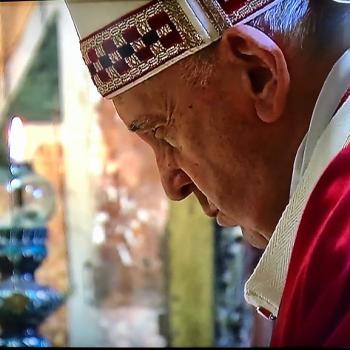By Sandra Lommasson
 Each one of us is created for relationship with God, and the capacity for that relating is written into our nature. A graphic way of expressing that truth is the saying "Each of us has a God-sized hole," meaning that nothing other than God can fill a basic human emptiness we each carry. Many (perhaps most) of us try to fill that God-sized place with activity or material possessions or human relationships, but none of these things are ultimately satisfying in themselves. While they are gifts of God to be enjoyed, they are no substitute for direct relationship with God. Relationship is something that needs focused attention to develop fully, and prayer is the most basic means given for the cultivation of this life-giving relationship with God.
Each one of us is created for relationship with God, and the capacity for that relating is written into our nature. A graphic way of expressing that truth is the saying "Each of us has a God-sized hole," meaning that nothing other than God can fill a basic human emptiness we each carry. Many (perhaps most) of us try to fill that God-sized place with activity or material possessions or human relationships, but none of these things are ultimately satisfying in themselves. While they are gifts of God to be enjoyed, they are no substitute for direct relationship with God. Relationship is something that needs focused attention to develop fully, and prayer is the most basic means given for the cultivation of this life-giving relationship with God.
What exactly is prayer? Its essence is bringing the truth of ourselves as we know it before God and then allowing space in which to "listen." It is interactive: we share ourselves -- hopes, thoughts, feelings, misgivings, beliefs, and so on -- not because this is new information to God but because self-revelation deepens relationship.
I may know, for example, that I'm not really sure a relationship with God is possible for me because I think of God more as a principle or impersonal power. Addressing that perception directly to God -- "I'm resistant to praying, God, because I can't envision relating to you personally" -- is a profoundly honest prayer.
As we bring the truth of "how it is with us" to God, we begin to experience ourselves being known. In the listening silence that follows such self-revelation, the task is simply to pay attention -- to attend to the thoughts and feeling that stir, to the images and memories that arise, and later in the day to the events of living through which God also speaks. These in turn can be honestly brought back to God: "In this silence, God, I have a sense that you're listening and I feel a mix of embarrassment and comfort." Or, "It's just like I thought it would be - nothing -- and that makes me angry, God. I don't like feeling like a fool for trying to pray." Then, again, listen and attend to what you notice, and respond.
Because prayer is relationship, the ways we have learned to relate to others will emerge in our relationship with God. An individual who finds it hard to ask for basic needs to be met in human relationships might discover that while it's natural to tell God all the things s/he's grateful for, the naming of personal needs to God feels somehow wrong and selfish. Engaging prayer with God in the ways I've described, being honest about our perceptions and then listening, begins to open us to new aspects of ourselves and to wider dimensions of relationship than we've considered possible. One of the most profound truths about prayer is that it transforms the one who prays.
I encourage you to begin a prayer experiment. Commit to 5-10 minutes a day for a month in which you share some part of yourself directly with God and then listen and respond. The commitment is important. All relationships need intentionality to build, and becoming familiar with one another's ways takes time.
It's also helpful to have a praying friend with whom you can share what happens as you undertake your experiment. Perhaps you'd like to ask someone to be a spiritual friend for the month by having a weekly conversation about how it's going. The important thing is to begin. May you experience the rich blessings of deepening relationship with the One who loves you more than you can ever know.
 Sandra Lommasson is the founder and co-executive director of Bread of Life, a spiritual formation center in Sacramento, CA, and a spiritual director. Her passion is creating processes and pathways for the formation of spiritual directors and leaders of religious or public organizations. She is a published author in the field of spiritual formation and served on the Council of Spiritual Directors International from 1999-2005.
Sandra Lommasson is the founder and co-executive director of Bread of Life, a spiritual formation center in Sacramento, CA, and a spiritual director. Her passion is creating processes and pathways for the formation of spiritual directors and leaders of religious or public organizations. She is a published author in the field of spiritual formation and served on the Council of Spiritual Directors International from 1999-2005.
3/18/2010 4:00:00 AM




